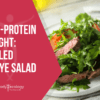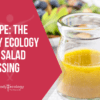Folate versus Folic Acid for Pregnancy
We are told that everyone, at every age and at every stage of life, needs folic acid.
Cereals are fortified with it, and practically every multivitamin contains it. In fact, according to the CDC (Centers for Disease Control), fortified cereals and a multivitamin are the two best ways that we can get our daily requirement of folic acid.
Folic acid helps prevent neural tube defects in a developing embryo, such as spina bifida. This is why pregnant women and women who could be pregnant are told to supplement with at least 600 mcg of folic acid a day.
This means that folic acid is not naturally found in food or in the human body!
When we hear about the health benefits of folic acid, what we are really hearing about are the health benefits of folate. This is an important distinction to make.
Unlike folic acid, the body does require folate.
- Folate is a B vitamin.
- It helps the body to make new cells, including red blood cells. A deficiency in folate can cause certain types of anemia.
- Folate is needed for sperm production in men and egg production in women.
- The human body needs folate to synthesize and repair DNA.
- Folate is necessary in the rapid growth and division of new cells.
- Folate is necessary for the proper neural tube formation in an embryo, as well as the proper development of the heart and facial structure.
 Should you take folic acid or folate? Most prenatal supplements contain folic acid as a cheaper ingredient, even though it doesn’t provide the same benefits to an unborn baby as biologically active folate.
Should you take folic acid or folate? Most prenatal supplements contain folic acid as a cheaper ingredient, even though it doesn’t provide the same benefits to an unborn baby as biologically active folate.When we take a folic acid supplement or eat foods that are fortified with folic acid, it is shuttled over to the liver, where only a small percentage of it ever gets converted into a useable form, called tetrahydrofolate or folate.
Many multivitamins and supplements will use folic acid, rather than biologically active folate. This is because folic acid is cheaper and easier to use.
Even though folic acid does not cross the placenta in the same way as natural folate, supplementing with folic acid will still prevent birth defects.
- Birth defects arise in cases of extreme deficiency.
- The conversion from folic acid to folate is extremely limited.
- In spite of this, there is still enough folate produced from folic acid supplementation to promote proper neural tube formation.
When we fail to metabolize folic acid, this means that the body fails to use it. If left unmetabolized, “too much” could be as little as the recommended daily allowance (RDA), which is 400 mcg.
When we have excessive amounts of folic acid in the blood, this can:
- Mask vitamin B12 deficiency.
- Lead to the development or progression of certain cancers. (1) (2)
- Depress immune function. (3)
Ways to Increase Your Folate Naturally
Look for supplements that have plenty of natural folate. On the ingredient label, folate could also be listed as:
- 5 methyl-tetrahydrofolate
- L methylfolate
Foods that are particularly rich in folate are:
- Liver. Eat liver 2 – 3 times a week. Be sure to find a source that can offer you liver from a pastured or grass-fed animal. Not only is the liver from a grass-fed or pastured animal most nutritious, but it is also free of toxins and synthetic hormones.
- Leafy greens. Such as kale and collards. If well tolerated, eat these on a daily basis.
- Spirulina. Spirulina is a nutrient powerhouse, hands down. If you are vegetarian, vegan, or do not consume organ meats, be sure and investigate all the many benefits of Spirulina. Spirulina delivers to the body all 8 essential amino acids, iron, and several B vitamins, including natural folate! Body Ecology Super Spirulina Plus is a fermented Spirulina, making it the most bioavailable form of Spirulina on the market.
- Fermented Foods. Fermented vegetables are naturally rich in folate. A cup of fermented veggies will also help improve your digestion and rebuild your inner ecosystem.
What to Remember Most About This Article:
Folic acid is recommended for pregnant women to prevent neural tube defects in a developing baby, but folic acid is not biologically active in the body. This means that folic acid isn’t naturally found in the human body or in food. There is a distinct difference between folic acid and folate – required by the body to protect reproductive health, prevent anemia, and repair DNA.
To increase folate in your diet naturally, you can use the following tips:
- Eat liver 2 to 3 times a week, preferably from a pastured or grass-fed animal.
- Eat leafy greens like collard and kale each day.
- Eat fermented Spirulina for all 8 essential amino acids, iron, B vitamins, and natural folate.
- Eat fermented veggies regularly to boost digestion and restore your inner ecosystem.
Product Recommendations:
- [product id=”1″]
- [product id=”4″]
REFERENCES:
- Hirsch S, et al. Colon Cancer in Chile Before and After The Start of the Flour Fortification Program With Folic Acid. European Journal of Gastroenterology and Hepatology. 2009 April; 21 (4): 436 – 439.
- Kim YI. Will Mandatory Folic Acid Fortification Prevent or Promote Cancer? American Journal of Clinical Nutrition. 2004 Nov; 80 (5): 1123 – 1128.
- Aron Troen, et al. Unmetabolized Folic Acid in Plasma Associated With Reduced NK Cell Cytotoxicity Among Postmenopausal Women. Journal of Nutrition. 2006 Jan; 136: 189 – 194.








